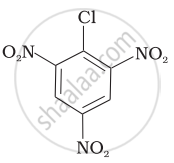Advertisements
Advertisements
Question
Write chemical equation in support of your answer.
Out of  Cl and
Cl and  CH2- Cl, which one is more reactive towards nucleophilic substitution reaction and why?
CH2- Cl, which one is more reactive towards nucleophilic substitution reaction and why?
Solution
 CH2 - Cl , will be more reactive towards SN2 reaction as in case of reaction as in case of
CH2 - Cl , will be more reactive towards SN2 reaction as in case of reaction as in case of  Cl the back side attack will be very difficult.
Cl the back side attack will be very difficult.
APPEARS IN
RELATED QUESTIONS
Chlorobenzene is extremely less reactive towards a nucleophilic substitution reaction. Give two reasons for the same.
Write the final product(s) in each of the following reactions:

The presence of nitro group (−NO2) at o/p positions increases the reactivity of haloarenes towards nucleophilic substitution reactions.
Write the product formed on reaction of D-glucose with Br2 water.
Out of (CH3)3 C-Br and (CH3)3 C-I, which one is more reactive towards SN1 and why?
Arrange the following compounds in increasing order of rate of reaction towards nucleophilic substitution.
| (a) |  |
| (b) |  |
| (c) |  |
Allyl chloride is hydrolysed more readily than n-propyl chloride. Why?
\[\ce{C6H12O6 ->[(Zymase)] A ->[NaOH][\Delta] B + CHI3}\]
The number of carbon atoms present in the product B is:
Assertion: Chlorobenzene is resistant to nucleophilic substitution reaction at room temperature.
Reason (R): C–Cl bond gets weaker due, to resonance.
Why haloarenes are not reactive towards nucleophilic substitution reaction? Give two reactions.
